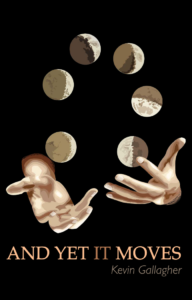Poet Kevin Gallagher chats with me today about his new collection, And Yet It Moves.

Bio:
Kevin Gallagher is a poet, publisher, and political economist living in Greater Boston. His most recent book is And Yet it Moves (MadHat, 2023) and recent books are The Wild Goose, and Loom. His poems and reviews have appeared in the Partisan Review, Harvard Review, ArtsFuse, Green Mountains Review, and beyond. Gallagher edits spoKe, a Boston area annual of poetry and poetics. He works as a political economist at Boston University.
Welcome, Kevin. Please tell us a little bit about your new release.
Let me share how the publisher, MadHat describes the new book:
‘In And Yet it Moves, the poet is an archeologist of mourning rediscovering that assaults on science and reason are not new phenomenon. Gallagher follows Petrarch, who spawns a new lyric in part inspired by lost texts, and who motivates ‘book hunters’ of the Renaissance to search for the buried as well. The world changed when Poggio Bracciolini discovered Lucretius’s On the Nature of Things in a Benedictine library. Lucretius’s poem is a meditation of the universe as infinite numbers of atoms wandering randomly through space with no master plan whatsoever. The book birthed humanist philosophy, masterworks such as the Birth of Venus, and inspirations for Galileo Galilei. When Galileo’s patrons the powerful Medici rose to the Papacy, they chose their power over science and reason—sentencing and silencing Galileo for life for proving that the earth revolved around the sun. Digging with his pen, Gallagher brings these stories back in ‘talking sonnets,’ as if ditching the Latin for the more colloquial Italian of the people that came into form during the era. Upon his sentencing, Galileo’s is said to have uttered ‘Eppur si muove,‘ knowing that the truth would eventually prevail.’
What do you enjoy most about writing poems?
The contact with a moment. There is no distraction when moved into a poem. I also love reading them to audiences. I don’t write for myself. To me poetry is an art of communication not only to the self but to the world.
Can you give us a little insight into a few of your poems – perhaps a couple of your favorites?
This book is a historical exploration of Medici Florence to make sense of the denial of science and reason in the present. The poem sequence ‘Cosimo de Medici’ in the collection has been fun to read at readings. To me it has a quick sardonic humor and a language that folks seem to get and laugh about at the same time. I get the same feeling with ‘Giovanni di Lorenzo de’ Medici’ who was the Medici Pope who squandered all the Papacy’s wealth and thus devised the Indulgences where sinners could pay the Pope to absolve their sins! When he went through everyone there he said come on back and we can absolve your dead relatives too! Had fun with those.
There are two others though that attempt to manifest the beauty of the time. I love to read the fourth poem in a sequence called ‘Lucretius’ which is my ‘translation’ of the Birth of Venus. I have another poem titled ‘Michelangelo’ which is a poem to his lover, Vittoria Colonna where I write
Those cragged stones in the mountain’s hide
become smooth sides, strong chests, awed eyes, winged shoes
and the deep songs of gods, saints, and herios.
I set them free with my hammer and chisel.
What form are you inspired to write in the most? Why?
These poems are ‘ruined sonnets.’ The book evokes Roman ruins—the rediscovery of Lucretius, the rebirth of wonder, the rise and fall of Medici, art, and science all in one cycle. The first draft were all perfect sonnets but my editor the poet Marc Vincenz and I snipped them down to be the ruins of the original, in projective verse.
What type of project are you working on next?
I am working on a new book of poems that in many ways is a prequel to my 2016 book, LOOM. In LOOM I trace –again through a historical excavation in dramatic monologue—how some of the most powerful Northern Elite switched their alliances and back abolitionism such to turn the tide of history. My new book, tentatively titled ‘Come Over and Help Us’ traces the Tempest of the Maylfower voyage and landing, the ‘translation’ of land and people here, and the ultimate demise of Native American agency in the Northeast. Not as redeeming for sure!
When did you first consider yourself a writer / poet?
I started self-identifying as a poet when I was 20, and haven’t turned back. If poems come even in times—jobs, family, stress—when you the furthest from thinking or being about it, you are a poet.
How do you research markets for your work, perhaps as some advice for not-yet-published poets?
I’m not sure I’m the guy for that. I don’t see poetry as a place of ‘markets’. I’m deeply grateful that you are interviewing me, but I write poetry as art and largely leave the marketing to the publishers of my eight books. All my work has been published by small presses. We are a small pond and that is where I swim.
What would you say is your interesting writing quirk?
Writing poems with the Boston Celtics on ‘mute’ every night—unless the game gets tight and then the poetry can wait!
As a child, what did you want to be when you grew up?
TINY ARCHIBALD
